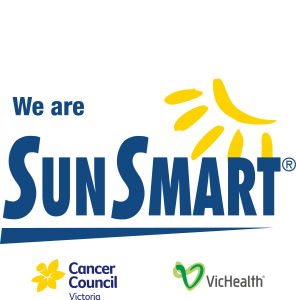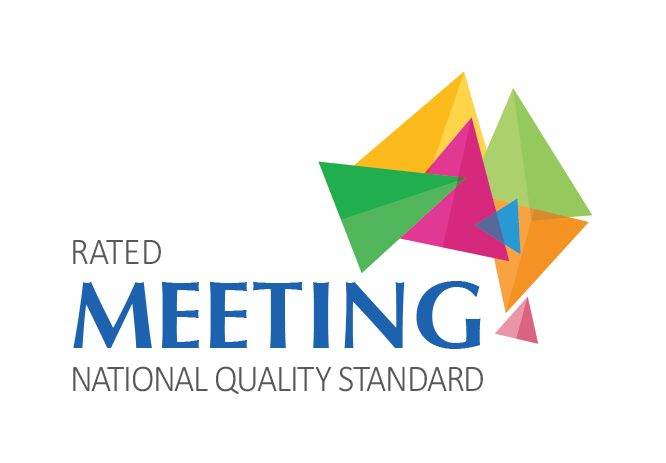Our Programs
Our Curriculum is in line with the Victorian Early Years Learning and Developmental Framework. This ensures children acquire necessary key knowledge and skills by linking the learning outcomes for children at our level, to the learning and teaching outcomes in the first stages of the Victorian school curriculum (the Victorian Essential Learning Standards or VELS). It recognises that between the ages 3-5, children build on the independence and self-control they have been developing. They learn to take initiative and assert themselves in socially acceptable ways. At the same time, they become keen observers of the world and experiment with their surroundings and find out what happens when they interact with others. Learning is an ACTIVE process that requires children’s involvement. Child-directed, as well as adult-led and guided PLAY, are essential to this process.
The program is responsive to children’s differences and builds on their capabilities, strengths, interests and knowledge. Children are encouraged to explore, to solve problems, communicate, think, create, and construct. A holistic approach is also necessary to any progression in learning, which requires recognition and development in their personal, social and emotional wellbeing. This is achieved by providing warm, trusting relationships as well as predictable and safe environments. Information is gathered and analysed to help assess and plan effectively, taking their interests and abilities into consideration.
Through continuing to develop our professional knowledge and skills, it enables us as Early Childhood Professionals, to provide the best possible practise and to adapt and change to meet our children’s and their family’s needs.
Download the Alchester Village Pre-School Information Booklet
There are 5 outcomes to describe the key elements to how children learn and develop.
These are:
- Children have a strong sense of Identity
- Children are connected with and contribute to their World/Community
- Children have a strong sense of Wellbeing
- Children are confident and involved Learners
- Relationships with children
- Children are effective Communicators
All early childhood services aspire to meet and exceed the standards of the National Quality Framework.
These include:
- Educational program and practice
- Children’s Health and Safety
- Physical Environment
- Staffing arrangements
- Relationships with children
- Collaborative partnerships with families and communities
Alchester Village Pre-School is currently rated as MEETING.
With the introduction of the Child Safety Standards we have outlined how we implement these. (on display in the foyer). Staff and children also abide by a Code of Conduct, which they contribute to and are discussed at the beginning of the year.
Families, students and all visitors to the Pre-School are also made aware of aspects from the standards which may apply to them and their interactions with the children, when present
Behaviour
This is one of the many kinds of teaching that adults do with children. Our aim is to help develop self-discipline within the child and responsibility for their actions. This is an ongoing process requiring many years before it is mastered. We will provide a learning atmosphere in which the child will be able to practice self-control, rather than obedience to adults. The staff will be very much in control, but the child will be able to make choices and learn about the responsibilities and consequences of doing so.
- Discipline is based on respect for others, their feelings and belongings
- Discipline is not punishment
- Desirable behaviour is praised and encouraged
For undesirable behaviours such as aggression or disruptive behaviour we:
- Ask the child to consider his/her actions and how it affects the people around them
- Ask the child to leave the activity and return when they can behave/interact appropriately
It is desirable for parents to be involved and to work with staff to overcome any behaviour issues or problems.
Important aspects of discipline include:
- LIMITS – Clear and few
- EXPECTATIONS – Appropriate to their age
- BE POSITIVE – Use “do” rather than “don’t”
- GOOD MODELLING – By the adult(s)
- PRAISE – Desirable behaviours
Discipline is a process of learning that continues throughout the year and throughout life.
Three Year Old Program
The children will come together in a group, where they learn social skills such as cooperation, group participation and self-esteem.
Learning is play based with the children having the opportunity to choose what they wish to do and experiment with a variety of materials presented in varying ways. Sensory input is vital at this stage, so many of the activities and experiences are very much hands on.
The children’s work is viewed as creative expression and exploration of materials and shouldn’t be looked on as representative work.
Adults support their play and develop independence by helping when needed, but allow the children to do what they are capable of doing by themselves.
Increased confidence is one of the greatest aids to further learning and will help the children with the transition to the 4 year old program.
Four Year Old Program
COCKATOO GROUP
Within the program the children will have the opportunity to learn about themselves, others and the world around them. It is drawn from everyday and seasonal experiences, the elements, the community and world events and most importantly it is based on the children’s interests.
The children have input into how and what they wish to do. Children have choices in what they do and we aim to highlight and celebrate their strengths and achievements.
It is designed in such a way that children can develop at their own individual rate, developing skills and abilities conducive to further learning.
We provide an indoor/outdoor program where children and staff move between the two. Activities are provided for both. We greatly value the outdoor setting as it offers much scope for learning.
F.A.Q.
What if my child only wants to be outdoors or Indoors?
- Through observations, staff plan for and provide experiences for children both in the in/outdoor environments
- Some activities will be provided for all children to do, as we assess their abilities and level of development
- There is the expectation for all to do some activities before they can move to the next area.
Do you provide any structures group times
- Both in the 3 and 4 year old programs, the children come together for a group experience
- Action song, rhymes, games, discussions take place, enabling children to listen, take turns, practice sitting together and be active participants
- Children not able to or are not ready are cared for alongside the group with the expectation they will join in as the year progresses
How does your snack routine work?
- In the 3 year old program children all sit together to have snack following group time, mid way through the session
- Placemats with their photos and name are placed out for them to find
- In the 4 year old program, children can have a snack at a designated snack table during the first 2 hours of the session
- They can decide when they wish to eat
- They have placemats with their names and photos on them, which they place on the table when they are ready to eat
- They get to sit at the table with different children daily
- Once completed, placemats are put under a trolley. This enables staff to see who hasn’t eaten, ensuring they all do
- There is a follow up snack time towards the end of the session in the form of a picnic snack, where they all sit together to eat more food provided
How many staff are in the groups?
- In the 3 year old groups, there is an Teacher and 2 Co educators
- The number of children present is 30 maximum
- In the 4 year old group there is an Teacher and 2 Co educators
- The number of children present is 30 children maximum
Does my child need to be toilet trained to attend?
- All children come and we address any needs as they arise
- We work together with the family to put a plan in place if they are being trained at the moment or need to nappy change the children if required
- You will be required to provide any nappies/pants during t his process
How can I find out about my child’s progress?
- We encourage you to approach the staff at any time. If the end of the session is not convenient you can contact them by email, phone
- Staff will always inform you of any concerns they may have, and suggest if any further consults need to be done
- Weekly Reflection books are provided by all groups, recording and documenting the group’s /children’s engagement in the program
- There are Individual reflection books for each of the children in the 4 year old program that gets shared by the families each term
- These are located in the room for the children to access during the session and can be viewed by the families
- We have allocated times during term 2 to formally discuss any matters
Do you have incursions / excursions
- There are two incursions ( visitors to the preschool) for each of the 3 year old groups
- Children may be taken out to the local park as part of the program
- There are 4 incursions for the 4 year old group
- We also have a planned walk to the local shops, visit the adjoining school to use the oval, visit their library as well as the prep classrooms during our school transition program
- We also utilize our families who may have something to contribute ie work based, emergency services or sharing of culture
What does play based mean?
- Children need to be able to explore, have choices and learn at their own pace. This is achieved through the provision of PLAY. It is as active participants in their play and environment that children learn to make sense of the world around them




© Copyright 2022. Alchester Village Pre-School
Contact Alchester Village Pre-school
Alchester Village Pre School is committed to child safety, and we follow the Victoria's child safe standards.
Alchester Village Preschool acknowledges that we are on the traditional land of the Wurundjeri people of the Kulin Nation. We acknowledge their stories, traditions and living cultures and pay respect to all Elders, past and present.